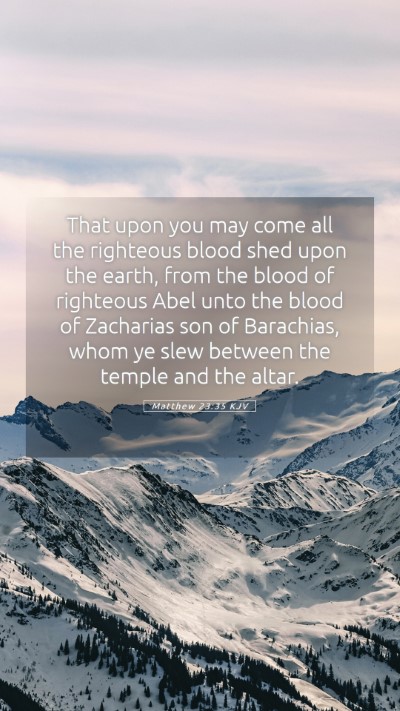Understanding Matthew 23:35
Matthew 23:35 states, "That upon you may come all the righteous blood shed upon the earth, from the blood of righteous Abel unto the blood of Zacharias son of Barachias, whom ye slew between the temple and the altar." This verse serves as a significant warning and a point of deep reflection on the consequences of rejecting divine truth and the fate of those who oppose God’s messengers throughout history.
Contextual Analysis
In this chapter of Matthew, Jesus delivers a series of woes to the Pharisees and religious leaders of His time. He condemns their hypocrisy, legalism, and failure to recognize the prophetic messages of God. This particular verse links the historical acts of violence against the prophets of God to the present guilt of the leaders who continued this tradition of violence against God's messengers, ultimately culminating in the rejection and crucifixion of Christ Himself.
Bible Verse Interpretation
According to Matthew Henry, this verse emphasizes the cumulative guilt that comes from the lives taken unjustly. Jesus points to Abel, illustrating that the shedding of innocent blood is not a new occurrence but part of a long, tragic narrative of rebellion against God.
Albert Barnes notes that the reference to 'righteous Abel' connects the leaders to the very first murder recorded in the Bible (Genesis 4:8), suggesting that their actions and heart positions align with that same spirit of hostility towards God’s chosen individuals.
Adam Clarke elaborates on the importance of 'Zacharias son of Barachias', mentioning that this represents the ultimate culmination of Israel's guilt in shedding the light they had received through divine messengers. Clarke suggests that while Ricky's blood marked the beginning of this violence, Zacharias symbolized its continuation in the New Testament context.
Lessons and Applications
This verse provides vital insights into the seriousness with which God regards the treatment of His messengers and the responsibility that leaders, in particular, carry. The implications for modern believers are multifaceted:
- Awareness of Spiritual Responsibility: Just as the religious leaders were warned, contemporary leaders and followers must recognize their role in upholding truth and compassion.
- Recognition of Historical Patterns: Understanding scripture in historical contexts helps reveal patterns of behavior that can recur in any generation.
- Personal Reflection: This verse invites individuals to reflect on their own attitudes toward spiritual authority and the messengers God sends into their lives.
Conclusion
Matthew 23:35 is a powerful reminder of the consequences of rejecting God’s prophets throughout history. It calls for deep reflection on our relationship with divine messages and messengers, urging Christians to embrace truth and act justly. The cumulative guilt expressed in this verse reminds us to learn from past mistakes rather than repeat them, thereby enhancing our Bible verse understanding and engagement in Bible study groups.
Cross References
- Genesis 4:8: The story of Abel's murder and its implications on righteousness.
- 2 Chronicles 24:21: Reference to the murder of Zechariah, reinforcing the theme of prophet persecution.
- Matthew 23:34: Earlier verse where Jesus points to sending prophets and wise men.
Further Study Resources
For those seeking deeper insights into the interpretation and application of this verse, consider engaging in Bible study tools that offer commentary comparisons, online Bible study courses, and Bible study guides that specialize in historical context of Bible verses.


